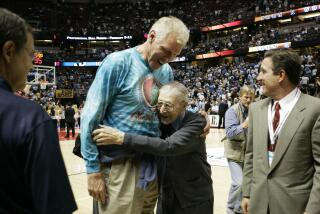Wooden Reward
- Share via
He was the different one. He was the wild one.
Andre McCarter was that poor, misguided UCLA Bruin who loved behind-the-back passes and double-pump reverse layups and getting in your face.
During a time when his teammates thrived in the spotlight, he was the one Coach John Wooden would sit in the corner.
“You know how, if somebody has 10 children, there is always one of them who is a real pain in the butt?” McCarter said. “That kid was me.”
He was publicly embarrassed. He was quietly benched. He was harangued and harnessed, his style abruptly changed, his attitude forcibly altered.
Since leaving UCLA after the 1976 season, Andre McCarter had been thinking of a way he could pay John Wooden back for all the trouble he caused.
Today, the country will see his answer.
Today, at the White House, Wooden will receive the nation’s highest civilian honor, the Presidential Medal of Freedom.
This was not an idea from President Bush. This did not come from a California senator or representative. This was not about lobbying efforts from the NCAA or UCLA.
Wooden is receiving the medal only as a result of a secret three-year campaign by a former player who collected letters, twisted arms, made calls and pushed forward when everyone thought he would pull back.
A guy named Andre McCarter.
“Yeah, I know,” said McCarter, 49, with a giant laugh. “I was the least likely guy to do this.”
He couldn’t tell Wooden, because Coach would stop it. He couldn’t ask for help, because somebody would leak it. He couldn’t cruise, because twice his efforts were rejected.
Embracing a Pyramid of Success that he often snubbed as a player, McCarter used loyalty, industriousness and poise to nudge the White House into honoring the same coach who once hassled him.
“I know now, what we learned on the court back then, we use in everyday life,” said McCarter, the coach at Lake Balboa Birmingham High. “What Coach taught me, it transcended basketball.”
*
It was three years ago. It was an award ceremony. People were receiving medals from the president.
Andre and wife Dolores McCarter were watching it on television. It looked pretty important. Dolores began wondering.
“Has Coach ever won one of those awards?” she asked.
Andre turned on the computer, surfed the net, and found a site that explained it.
“We had no idea what the award was about,” he said. “Then we found it.”
It was huge. It was exclusive. And it was perfect.
The Presidential Medal of Freedom is an award given every year to, among others, individuals of, “significant public or private accomplishment.”
In recent years, Nancy Reagan has won one. So has Hank Aaron and Simon Wiesenthal.
The list is varied, but the denominator is the same.
“Everybody did something important for people,” said McCarter. “I was thinking, look at all the people affected by Coach.”
He searched for the rules. There were no rules.
“As best I could figure it, I had to just send in a letter of nomination,” he said.
But the Pyramid emphasizes intentness. So McCarter knew he couldn’t just send one letter.
“I wanted to overwhelm those people,” he said.
So he laboriously tracked down players from every phase of the Wooden era, and asked them to write letters.
He found George Stanich, from Wooden’s first team in 1948. He contacted Jack Davidson from Wooden’s team in 1952.
He enlisted everyone from Vaughn Hoffman to Bill Walton, from Gary Cunningham to Jamaal Wilkes, from Willie Naulls to Marques Johnson.
“I didn’t just want the stars,’” McCarter said. “I wanted people who Coach had helped become better people.”
These former players had become successful businessmen, and parents, and neighbors. To each of them, McCarter made a simple request.
Write about it. Nothing fancy, nothing long, just write a letter about what Wooden meant in their lives.
For nearly five months, McCarter collected those letters.
Some were typed on elegant stationery. Others were scribbled on scratch paper. One letter was written in street slang and required translation.
One player sent three essays, claiming each successive submission was better than the previous one.
Another player sent three faxes to correct one misspelled word.
One player became busy, and forget to write anything, so McCarter called the player’s mother.
“She got him over to her house and ordered him to sit down and write the letter before he left,” he recalled.
Another player became forgetful, so McCarter attended a party at his house, walked up to him, and poked him on the chest.
“I told him, ‘I want my letter! Now!’ ”
When the 30 or so letters were collected in the fall of 2000, McCarter added his own cover letter, threw in a Pyramid of Success for good measure, and shipped it off to Washington.
He promptly received a rejection from the Clinton Administration, which, he says, claimed it was a difficult time because they were leaving office.
So in the fall of 2001, with President Bush in office, he tried again. This time, he heard nothing.
“I figured, with 9/11, they had other things to worry about,” McCarter said. “It wasn’t going to stop me. Every year, as long as I was alive, I was going to send that package.”
Late last year, he plopped it into the mail again. He heard nothing until Saturday, when a friend called to say he saw Wooden’s name in a story in this newspaper.
“My friend was like, ‘You know that award you’ve been trying to get for Coach? I think he won it!’ ” recalled McCarter. “I could not believe it.”
Wooden, who was phoned by the White House on Friday, also did not believe it. Literally.
He told the president’s office that unless they sent him a letter the next day by courier, he would consider it a prank.
The next day, a letter arrived, and he was even more stunned.
“Pops didn’t want to go because he felt the award should go to somebody more deserving,” said Dick Muehlhausen, his son-in-law. “I told him, ‘You have changed lives. That’s a gift.’ ”
When Wooden finally decided to accept the medal, his daughter Nan broke the more startling news: There had been a campaign, and it had been run by Andre McCarter.
Wooden picked up the phone and dialed his former pest.
This was the player he once refused to start for four games because he was five minutes late to a pre-game meal.
This was the player he once loudly scolded for a showboat play on the first day of practice in front of coaches from around the country.
“Gracious sakes alive, Andre, you do that, you won’t play at UCLA,” he screamed.
A quarter of a century later, his voice had a different tone.
“He talked to me in a way I’ve never heard before,” said McCarter. “He was so emotional, so thankful, so happy.
“He so believes in our country, it was like there was nothing more important to him.”
McCarter, who has written a coffee-table book about Wooden’s championships that could be released this winter, felt his career came full circle.
“He always talked about how, you have one season, this season, and you have to give it your best and a leave a marker before it ends,” McCarter said. “I guess this was my way of finishing the season.”
Wooden was traveling to Washington on Tuesday and could not be reached for comment.
But his family can’t wait to see McCarter.
“I’m going to tell Andre, that’s the greatest thing you could have done,” said Muehlhausen. “Not just for Pops, but also for yourself.”
Bill Plaschke can be reached at bill.plaschke@latimes.com.
More to Read
Go beyond the scoreboard
Get the latest on L.A.'s teams in the daily Sports Report newsletter.
You may occasionally receive promotional content from the Los Angeles Times.







